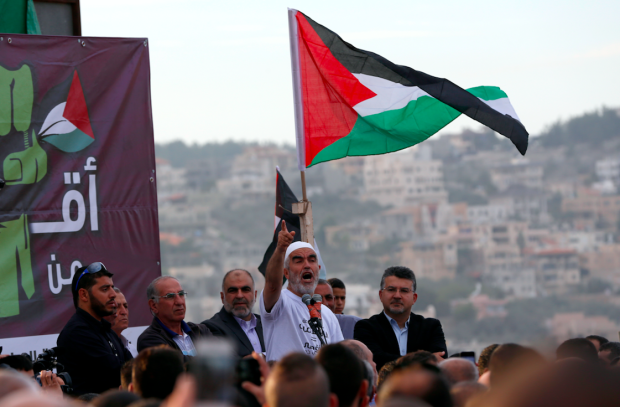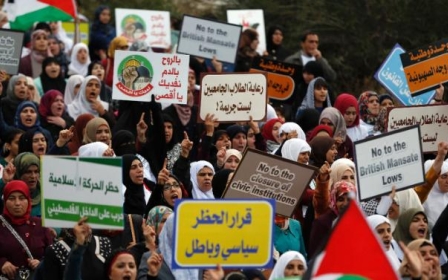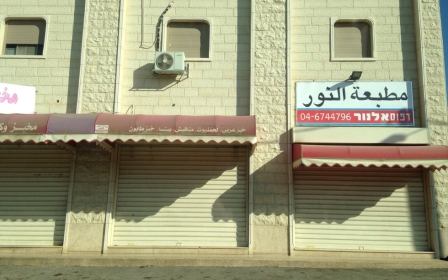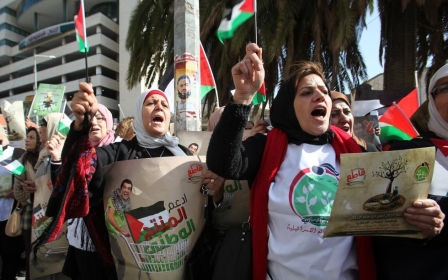Banned Islamic leader: Netanyahu pushing region to religious war
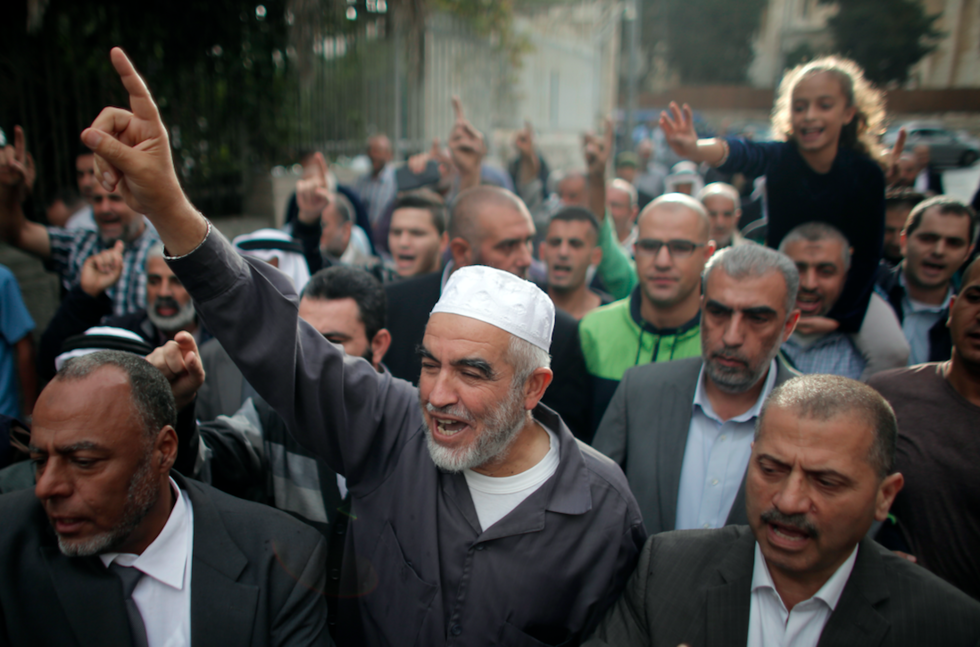
In the tangle of back streets in the city of Umm al-Fahm, the three-storey building that until recently housed the headquarters of the northern Islamic Movement stands dark and empty, its front-door padlocked shut.
The movement’s leader, Sheikh Raed Salah, has been forced to decamp to a large covered market on the outskirts of the city that has been hurriedly converted into an unlikely hub of political activity for Israel’s Palestinian minority.
Tens of thousands of visitors have come to this protest tent in the past three weeks, since Israeli Prime Minister Benjamin Netanyahu invoked emergency laws – bequeathed by the British Mandate authorities in Palestine 70 years ago – to declare the movement an “illegal organisation”.
Salah told Middle East Eye that the move was “a declaration of war not just against our movement but against Islam and against the whole Palestinian community [in Israel]. Everyone feels targeted.”
New MEE newsletter: Jerusalem Dispatch
Sign up to get the latest insights and analysis on Israel-Palestine, alongside Turkey Unpacked and other MEE newsletters
Technically anyone supporting the Islamic Movement, a political and religious movement that boasts more than 10,000 members, now risks being arrested and jailed. But it is still unclear how the ban will be enforced in practice.
Ofer Zalzberg, an Israeli analyst with the International Crisis Group, a conflict resolution think-tank based in Washington and Brussels, said the Shin Bet appeared still to be considering whether to implement the measure with a light or heavy touch.
“There is a concern about the wider effect on the Palestinian minority and the danger of radicalising its membership,” he said.
‘We will fight’
Polls conducted before the ban showed that more than half of the Palestinian minority believed Salah’s movement represented them, including many Palestinian Christians.
At a protest march in the city last weekend, leaders from across the political spectrum paid tribute to Salah and denounced the ban as a declaration of war on the entire Palestinian community, a fifth of Israel’s population.
The positions of Salah’s movement, the Israeli branch of the Muslim Brotherhood, may sound extreme to Israeli Jews. He refuses to engage with Israel as a Jewish state, does not participate in its national elections, and accuses Israel’s leaders of engineering a takeover of the al-Aqsa mosque in Jerusalem.
But the sheikh does not advocate violence, and distances himself publicly from the struggle of Hamas, the movement’s ideological twin ruling Gaza. Last year he told Middle East Eye: “Their struggle is different. They live under occupation.”
In a sign of the current mood – as well as a widespread fear that Israel’s Palestinian political parties in the parliament are now in Netanyahu’s sights – the marchers called out: “We will not shut up. We are all with the Islamic Movement.”
Salah reflects that mood of defiance. Seated in the protest tent, he tells MEE: “I am head of the northern Islamic Movement and will continue to be so, whatever Netanyahu declares. We will fight for this movement.”
Authorities have also taken aim at Salah personally, with an Israeli court in October sentencing him to 11 months in jail for inciting violence. He has appealed the verdict but says he could be imprisoned within days.
Waiting for evidence
Immediately after Netanyahu’s declaration on 17 November, Salah was invited to a four-hour interview with police in the city of Haifa, at which he was accused of providing support to terrorist organisations.
Although such claims have been repeated by Netanyahu, Salah is still waiting to see the evidence. His lawyers point out that, if evidence of material support exists, Salah should have been charged at the meeting and be awaiting trial.
The sheikh dismisses the accusations as “a campaign of baseless propaganda,” just as he does Netanyahu’s comparison between his movement and Islamic State.
“This is simply incitement against the Islamic Movement. What Netanyahu has made clear in recent months is that he is a factory of incitement and of terror. He should be the last one to speak of incitement," he said.
A 30-day window to appeal the decision expires in just over a week. Salah says his lawyers are still considering whether to turn to the Israeli supreme court.
Their hesitation appears to be prompted by concerns about the make-up of the court, which has moved to the right in recent years. Should the judges reject Salah’s appeal, Netanyahu’s decision, which currently smells of a purely political manoeuvre, will be given the stamp of judicial authority.
The movement is taking steps both locally and internationally, the sheikh says. Protest tents and demonstrations across the country will continue. His advisers are also getting support from international human rights groups. “They have made it clear that they stand with us,” he said.
Another option being considered is an appeal to UN bodies.
Thousands losing aid
Equally pressing for Salah is the practical matter of how to ringfence dozens of religious institutions, charities and welfare services assisted by the Islamic Movement, including health clinics and educational projects.
Some of the associations provide food, pay electricity bills, and run children’s activities for tens of thousands of poor families.
In Jaffa, a city next to Tel Aviv, hundreds of needy families have been left without financial help after the Jaffa Charitable Association’s staff were locked out and their bank account frozen.
More generally, according to Salah, the closures will affect half a million Palestinian citizens.
The Islamic Movement, observers note, has stepped in to fill in the stark social and economic gaps left by decades of discrimination towards Israel’s Palestinian minority.
Netanyahu appears to want to sever these connections to weaken the movement’s popularity. But equally the move may rebound on him, unless he is prepared to make up the funding shortfall – an unlikely prospect.
Salah says most of the associations, though helped by the Islamic Movement, are not politically aligned with it.
“They are independent from us, but still their work is being interfered with,” he told MEE. “And remember while Netanyahu is closing down health clinics and kindergartens here, his government is funding 19 settler groups, including those organising terrorist attacks on Palestinians.”
According to Salah, Netanyahu has tried to take aim not just at his movement, but at the entire Palestinian population. More specifically he believes the measures aim to disrupt the movement’s strong presence at the al-Aqsa mosque compound, the Haram al-Sharif, in the Old City of Jerusalem.
Salah has been leading a campaign under the slogan “Al-Aqsa is in danger” for nearly 20 years. He argues that Israeli leaders are asserting ever greater control over the site, where they believe the ruins of two ancient Jewish temples are located.
The Israeli prime minister has repeatedly accused Salah of incitement over al-Aqsa and blamed him for the unrest that has periodically erupted in Jerusalem since last summer.
‘Goal to create vacuum’
“Netanyahu thinks that by banning us he can create a vacuum at al-Aqsa,” the sheikh said. “He hopes that will give him the chance to increase the raids by the occupation forces [to remove Muslim activists from the compound].”
“His ultimate goal is to impose a division at al-Aqsa,” he added, referring to fears that Israel wishes to break with traditional, if waning, rabbinical prohibitions against prayer at the site.
At some point Israel will try to enforce a separate prayer space and prayer times for Jews, echoing what it did at the Ibrahimi mosque 20 years ago, Salah warned.
But Netanyahu will fail, he concluded. “The ban serves only to make our role even more important. Now the entire Palestinian public understands that they must make efforts to defend al-Aqsa, not just the Islamic Movement. The ban has recruited everyone to this cause.”
He points to the fact that the buses the movement regularly runs from Palestinian communities in Israel to Jerusalem have increased by 50 percent since the movement was outlawed. Salah considers the buses a vital weapon to bolster Muslim presence at the mosque, as Israel imposes ever tighter restrictions on worship.
“Could there be a stronger proof that this ban will not scare people and that it is counter-productive?" Salah said, while adding that the timing of the ban appears opportunistic, exploiting anti-Muslim sentiment in the West following the Islamic State group's attacks in Paris in which 130 people were killed.
Collusion by Arab states
But he also accuses neighbouring Arab countries of colluding in the decision.
“The origins of this ban date to the renewal of relations between Israel and Egypt after [President Abdel Fattah] Sisi came to power.” Sisi ousted the Muslim Brotherhood in Egypt in 2013 in a coup and quickly declared the movement an illegal organisation.
Netanyahu was taking advantage of the Muslim Brotherhood’s beleaguered status in the region, the sheikh said.
More intriguingly, Salah also points the finger at another Arab state.
He believes the crackdown on the Islamic Movement was engineered at a meeting in late October between Netanyahu and US Secretary of State John Kerry. The talks were ostensibly designed to calm mounting tensions in Jerusalem over al-Aqsa.
Afterwards, Kerry, Netanyahu and King Abdullah of Jordan, who is formally responsible for al-Aqsa through an Islamic body known as the Waqf, agreed to set up cameras at the site to monitor events there.
Salah says that, according to his sources, a senior US official told his counterpart from an Arab country – which Salah declines to identify – that the agreement was also designed to “clear the path to banning the Islamic Movement, to get us out of the way”.
Jordan has been expressing increasing concern to the US about the role of the Islamic Movement at al-Aqsa, according to a diplomatic source.
Amman is worried that Salah is undermining its authority there, and prefers that the spotlight be removed from the mosque compound in the current Palestinian unrest, said the source.
Parties under attack
With the pressure on Salah and his movement ramping up there are also fears that Israel may now target other Palestinian political movements.
“This is just a prelude. There is already talk among officials about banning the Balad party,” Salah said, referring to a democratic nationalist party with three members in the Israeli parliament.
Balad leaders have outraged the Israeli right by denying that Israel can be both Jewish and democratic, and by demanding equal citizenship.
Salah highlights examples of the Israeli leadership’s current mood of open hostility towards Palestinian leaders in Israel.
Only a court ruling prevented Balad MP, Haneen Zoabi, from being banned from standing in the March general election.
Ex-MK Said Nafa was jailed for a year in September for visiting Syria.
Other figures, such as Raja Aghbaria, leader of Abnaa al-Balad, which campaigns for a single democratic state in the region, are under investigation, notes Salah.
The Shin Bet intelligence service, he observed, advised against the ban, fearing that it would radicalise the Palestinian minority.
“In any normal country, there is a duty on the politicians to listen to their intelligence services. But Netanyahu simply ignored their advice, and that indicates the level of craziness that has been reached here," Salah said.
“After Paris, we issued a statement condemning the attacks. But Netanyahu wants to libel Islam as a violent, extreme, inciteful religion. It is Netanyahu who is leading the region to a religious war.”
Middle East Eye delivers independent and unrivalled coverage and analysis of the Middle East, North Africa and beyond. To learn more about republishing this content and the associated fees, please fill out this form. More about MEE can be found here.


